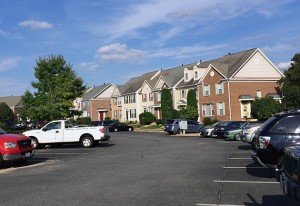Stacy Shaw
 The residential neighborhood in Kingsbrooke where parents were told children should not play ball in the street.
The residential neighborhood in Kingsbrooke where parents were told children should not play ball in the street.
According to Prince William municipal law, children are not allowed to play ball in the road without receiving a specific permit to do so. Last week, a resident of the Kingsbrooke community in Bristow shared a scenario he experienced. His son, along with neighborhood friends, gathered for a game of football on their quiet residential street. One neighbor complained that the boys should not be playing ball in the street and called the police. Consequently, a police officer arrived at the man’s home and informed him that ball-play recreation was illegal on county roads, even within an HOA community. According to Prince William Police, the officer is correct.
Municipal Code Sec. 13-408 refers to playing on highways; use of roller skates, skateboards, toys or other devices on wheels or runners. According to this law, section a: “It is unlawful for any person to play in or on a highway, other than upon the sidewalks thereof.” There is an exception, however. Section b. states a person may use a toy vehicle on a roadway if the speed limit is 25 miles per hour or less, and if there is less than two travel lanes, or if it is on a private road “outside the residential district.” Thus, the county allows children to ride bikes, skateboards, scooters and skates on residential roads that are less than 25 miles per hour and are only two-lane roads. However, the same allowance does not extend to other types of recreation, such as ball games. The second exception refers to Sec. 13-410: Designation of highways as play areas.
Municipal Code Sec 13-410 states that recreation is not allowed on highways unless the chief of police has authorized it to be used for “for sledding or other similar recreational activities.” Thus, police can close roads for recreational activities such as fun runs or parades, but residents should not hold recreational games in the street. The police even have to abide by certain regulations that respect residents’ rights. For instance, before making such a designation, the police chief or his employees would need to obtain the written approval of all property owners and tenants whose sole access is from or through the proposed portion of the highway. Appropriate barriers also need to be erected. However, when the office cited these codes to the resident, he was confused. The codes identified a road as a “highway,” but the children were not playing on a highway as people think of a highway; they were planning on a quiet residential road in an HOA community. According to another municipal code, the distinction does not matter. Firstly, the code uses the term “highway” in a broad sense to include other roads. Secondly, another code justifies HOA streets as within the purview of county police. Sec. 13-276 refers to “regulations of traffic and parking in subdivisions employing a system of roadways and parking areas open to the public.” It states that the county police will enforce all county codes in subdivisions. Section b. reads:
The police department shall enforce all of the provisions of the County Code regulating motor vehicles and traffic within all subdivisions in unincorporated areas of the county, whether under control of homeowner's associations or other associations, maintaining their own streets, sidewalks, parking areas, recreation areas or other common areas or ways in public use but not in public ownership, on the request or with the consent of the owners or the association of owners. Any law enforcement officer to this county properly enforcing the law shall not be subject to any civil or criminal action for trespass while enforcing the law in or upon any property in public use but not in public ownership.
Ultimately, children are not allowed to play on any streets within Prince William unless the roads are private. Moreover, according to notes within the municipal code, the code matches that of state code. Police do not usually monitor residential streets for children playing in them. However, once a complaint has been filed, the visiting officer told the family he would keep them on his radar. Kingsbrooke does have a sign for drivers entering into the community to watch for children, but according to Prince William Police spokesperson, Officer Jonathan Perok, that sign is jut a warning, but does not exempt the community from the law. "Any exception or exemption to the law would have been stated in the law itself," Perok said. With small backyards for townhouse residents and parks that focus on recreation for younger children, perhaps there is a need for more open space in neighborhoods where children can play.
Would you call the police on children playing in your neighborhood or look the other way? What street activities do you find the most dangerous or offensive? Leave a comment below.
 The residential neighborhood in Kingsbrooke where parents were told children should not play ball in the street.
The residential neighborhood in Kingsbrooke where parents were told children should not play ball in the street.